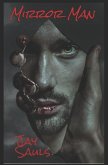If you like The Shining, The Sixth Sense, or Shutter Island, you'll love this book. In the winter of 1974, Old Man Winter came calling, again. In August of '74, Detective Penelope Bryce had just won her four-year legal battle with the City of Philadelphia and finally earned her Detective Badge. Her first case ended up being her last. Penny's new partner, Detective Frank Bruno, was wrestling with his own demons when he came across Old Man Winter himself, Garrison Winter. The grizzled detective would finally meet his match. Detectives Bryce and Bruno would attempt to chase down the man they suspected in the disappearances of nine elderly people across seven states and five decades. Who was the phantom, the ghost, or the devil that they were chasing? Only death would answer their question. Editorial Review: Criminal Activity Blog: Elias J. McClellan - Crime Writer Michael Cook's Old Man: Winter Heavenly Gates, begins with a murder. An old fashioned Columbo-style murder. Yes, yes I stand by that analogy. Cook's story is set in 1974, after all. However, the scope quickly expands as the death count mounts. Based on isolated actual events, OMW tracks the proto-investigation of murders dating back 50 years, as stumbled upon by newly-minted detective Penelope "Penny" Bryce. If this sounds similar to Thomas Harris' Silence of the Lambs, that is a healthy comparison. But where Harris takes the modern interstate to his destination, Cook takes the back alley. The first female detective in the Philadelphia Police Department, (and that as the result of a lawsuit) Penny is snubbed by her own commander and suffers hazing at the hands of her fellow detectives, except for Frank Bruno. Frank, emotionally crippled by grief, sees professional enthusiasm and strong instincts for the job in Penny and takes the rookie detective under his wing. Cook's brilliance is in the tone of the time. In the first pages Cook gives the reader a nose full of antiquated attitudes as potent as the distinct smell of the cold northeast winter. More than "just the way it was," the attitudes are all the more jarring once you realize that this is what women still face, today. Then there is the technology or lack thereof. Penny and Frank dance a cat-and-mouse tune through snowbound cars (with windows off of their crank-up track) and steam-heat-musty offices. As they begin to suspect they're actually after a serial killer, (still new terminology in '74) Frank turns to the Federal Bureau of Investigations. But the FBI's Behavioral Science Unit is barely two-years old. While Thomas Harris' FBI (Clarice Starling, Will Graham, and Jack Crawford) are highly skilled, motivated, and boy-scout capable, Cook's FBI, especially agents in the BSU, are tentative and still finding their way. We've become so accustomed to crime scene investigations through movies, television, and books, it's easy to forget that actual scientific investigation, like the BSU, was in its infancy. DNA would not be used for another 12 years. So, following Penny and Frank as they leg-work this investigation only adds to the suspense. However it is apparent early on this isn't a police procedural. Contrary to the cover, it's not quite a psychological thriller, either. What OMW is then is a mystery of perception and a test of faith. Which brings us to our killer. I won't spoil the ending here, obviously. Suffice to say, the clues are there from the beginning, marking our path like a map to the eventual reveal. And an unsettling conclusion. Those who enjoy a good who-done-it but have a low gore point will love OMW . Cook writes against most established tropes. The Columbo analogy really does stand up in this regard. There is no graphic violence, no sexual violence, no misogyny and only passing reference to a murdered child.
Hinweis: Dieser Artikel kann nur an eine deutsche Lieferadresse ausgeliefert werden.
Hinweis: Dieser Artikel kann nur an eine deutsche Lieferadresse ausgeliefert werden.








